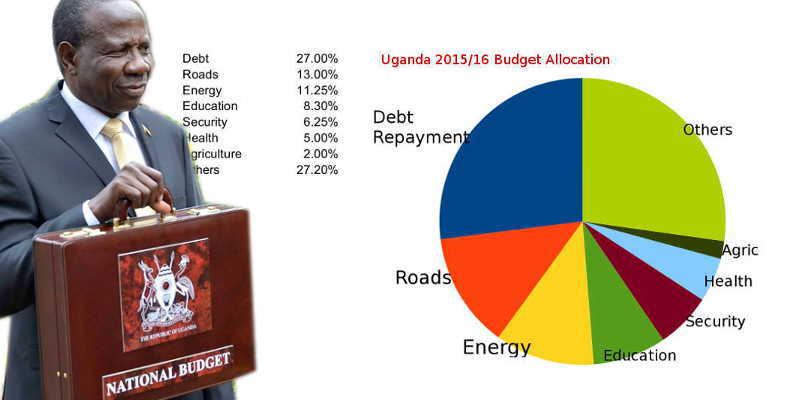President Yoweri Museveni has defended his government’s continued and sustained spending Uganda’s infrastructure saying they have improved regional and international market access for Ugandan producers.
The presiden’t comments came amid growing concerns that a lot of money has been channelled to the sector relative to other equally important sectors such as agriculture, health and education that impact greatly on the lives of ordinary people.
In the latest Budget, the government has again allocated Ushs. 3,3 billion, which is took the lion’s share of the budget behind debt repayments which took Ushs6.5trillion of the budget. Agriculture in the 2015/16 budget has been allocated Ushs 484 billion.
Finance Minister Matia Kasaija noted that corresponding infrastructure spending will continue over the coming years.
Kasaija said: “ Over the last 2 years, as we are all aware, there has been significant increase in Government spending in infrastructure. This trend will continue in the next few years.”
Museveni hailed the NRM caucus for supporting his priorities.
He said: “I want to salute the NRM Caucus and other positive leaders for supporting some of my prioritization measures since 2006 ? the Conference we had in Statistics House. Since that time, we have spent and we are planning to spend quite a bit of our money on electricity generation, electricity transmission, the roads and scientific innovation in addition to all the other expenditures on the other sectors.
“This has had a marked impact on these sectors ? electricity and roads ? that form the base of the economy. When Ugandans are able to travel on a tarmac road from Oraba-Karuma-Kampala-Mbarara-Kabale to Kyanika/ Bunagana, a distance of 1,057 kms; then, from Oraba-Karuma-Kampala-Mbarara to Murongo bridge, a distance of 906 kms, respectively and from Malaba-Kampala-Fort-Portal-Lamia River a distance of 630 kms; Malaba-Kampala -Fort Portal to Mpondwe, a distance of 517kms respectively, I feel very pleased.”
Museveni boasted: “Soon, Ugandans will be able to drive on a tarmac road from Nimule up to Kampala and from Moroto up to Kampala.”
For the 2015/16 budget the government has allocated over Ushs 2 trillion to the energy sector.
Kasaija noted that increased energy investment have improved the quality of life for more Ugandans.
“National electricity access has increased from 11 percent in 2011 to 14 percent in 2014. During the same period, rural electricity has increased from 4 percent to 7 percent. Power loses in the Distribution Network now stand at 20 percent from 27 percent in 2011. The total Grid electricity Supply increased by 5.4 percent from 3,039 Giga Watt hours (GWh) in 2013 to 3,203 Giga Watt hours (GWh) in 2014.”
Experts have however noted that increased spending on roads and dams has not added corresponding value to Uganda’s economy because of corruption but also because the government has not empowered the masses to take advantage of the infrastructure.
Godber Tumushabe, Associate Director of Great Lakes Institute for Strategic Studies (GLISS) argues that the new budget is a huge betrayal of Ugandans since it does not provide sufficient funds for what he considers the three crucial sectors that affect majority of Ugandans; I.e Education, Health and Agriculture.
“If only the huge jump in the budget allocation was going to the sectors that affect the ordinary person, it would be fine. But you see the same sectors that have been getting huge allocations year in year out, again featuring this time. You see trillions going to security, State House, Public Administration, Infrastructure which are riddled with corruption and inefficiency,” Tumushabe adds. “On the contrary, the essential sectors such as health and agriculture, have regrettably received lesser percentages.”








